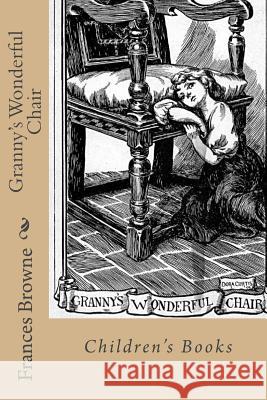Granny's Wonderful Chair: Children's Books » książka
Granny's Wonderful Chair: Children's Books
ISBN-13: 9781543163582 / Angielski / Miękka / 2017 / 180 str.
PREFACE The writer of "Granny's Wonderful Chair" was a poet, and blind. That she was a poet the story tells on every page, but of her blindness it tells not a word. From beginning to end it is filled with pictures; each little tale has its own picturesque setting, its own vividly realised scenery. Her power of visualisation would be easy to understand had she become blind in the later years of her life, when the beauties of the physical world were impressed on her mind; but Frances Browne was blind from infancy. The pictures she gives us in her stories were created, in darkness, from material which came to her only through the words of others. In her work are no blurred lines or uncertainties, her drawing is done with a firm and vigorous hand. It would seem that the completeness of her calamity created, within her, that serenity of spirit which contrives the greatest triumphs in Life and in Art. Her endeavour was to realise the world independently of her own personal emotion and needs. She, who, out of her darkness and poverty, might have touched us so surely with her longing for her birthright of light, for her share of the world's good things, gives help and encouragement to the more fortunate. In reading the very few details of her life we feel the stimulation as of watching one who, in a desperate fight, wins against great odds. The odds against Frances Browne were heavy. She was born at Stranorlar, a mountain village in Donegal, on January 16, 1816. Her great-grandfather was a man of considerable property, which he squandered; and the younger generation would seem to have inherited nothing from its ancestor but his irresponsibility. Frances Browne's father was the village post-master, and she, the seventh in a family of twelve children, learning privation and endurance from the cradle. But no soil is the wrong one for genius. Whether or not hers would have developed more richly in more generous surroundings, it is difficult to say. The strong mind that could, in blindness and poverty, secure its own education, and win its way to the company of the best, the thoroughly equipped and well tended, gained a victory which genius alone made possible. She was one of the elect, had no creative achievement crowned her triumph. She tells us how she herself learned by heart the lessons which her brothers and sisters said aloud every evening, in readiness for the next day's school; and how she bribed them to read to her by doing their share of the household work.
Zawartość książki może nie spełniać oczekiwań – reklamacje nie obejmują treści, która mogła nie być redakcyjnie ani merytorycznie opracowana.











